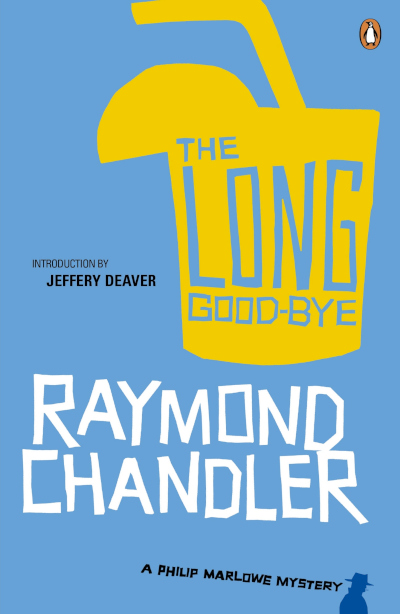|
The Long Goodbye

Raymond
Chandler's The Long Goodbye was published in 1953 and is the
penultimate book featuring the famous "hardboiled" private detective
hero Philip Marlowe. Chandler considered this to be his best work
(although critics and fans would probably disagree and favour Farewell,
My Lovely and The Big Sleep) primarily because of the more personal
nature of the text. His wife was terminally ill at the time and The
Long Goodbye is longer and more heartfelt than previous Marlowe novels
with more of Chandler's own personal thoughts and experiences expressed
within the story by proxy characters.Despite
his status as one of the great American popular authors, Chandler was
actually raised in England where he received a classical education and
this part of his background always gave him something of a sniffy
cynical outsider's view of Los Angeles and Hollywood. The quality is
more and more apparent in Marlowe as he navigates the corrupt neon
drizzled city streets once again.The
story begins in 1949 with Marlowe encountering a drunken man who has
collapsed outside a nightclub. The man is named Terry Lennox and his
wife has driven off, leaving him (quite literally) in the gutter.
Marlowe helps the man and gives him a lift back to town, some coffee
and money to get home. A week later, a sober and smart looking Lennox
returns to Marlowe's office to pay back the money he owes him and the
two become casual friends, occasionally meeting up for a drink at a bar
they like.However, one morning
Lennox arrives at Marlowe's house looking deeply concerned and very
frazzled. "The persistent ringing of the doorbell yanked me out of bed.
I plowed down the hall and across the living room and opened up. He
stood there looking as if he hadn't slept for a week. He had a light
topcoat on with the collar turned up and he seemed to be shivering. A
dark felt hat was pulled down over his eyes."Lennox
announces that he has to get out of the country as soon as possible and
asks Marlowe to drive him to the Mexican border. Marlowe does as he
says, deliberately trying to keep his beak out of the precise details
of this emergency as much as possible, but on his return is arrested by
the police. It transpires that Lennox's wife was found dead and Marlowe
is now a suspect by association. Marlowe is released after a brutal
interrogation, returns to his office and reluctantly takes on a new
case when he is hired by a woman named Eileen Wade who is trying to get
her novelist husband Roger out of a dubious sanatorium. But Mrs Wade
seems more interested in asking questions about Terry Lennox than the
welfare of her husband. What is going on?The
Long Goodbye marks a slight direction change for Chandler and even
begins in unusual fashion as it is Marlowe himself who goes to aid
Terry Lennox and unwittingly embroils himself in a mystery. We are used
to the detective being approached by enigmatic clients who he doesn't
trust so it's quite surprising to see our distrustful loner hero going
out of his way to help a stranger early on.It's
an interesting idea to give Marlowe a tarnished soulmate and Roger Wade
also functions in this capacity more or less when introduced later in
the story. The Long Goodbye is not really about the mystery at the
heart of the book but still manages to thrive at its best with
Chandler's sardonic dialogue and the supporting cast of characters. In
a strange way you learn more about Raymond Chandler than Philip Marlowe
in the book. Characters speak for Chandler while Marlowe tends to keep
his own emotional cards close to his chest.One
can see reading these novels how Marlowe influenced Ian Fleming when he
wrote his James Bond series. Bond and Marlowe are both heroes who have
to teach themselves not to care too much in order to do their jobs
properly and Fleming's violent hardboiled pulpy style feels very
Chandler at times. One thing Chandler and Fleming possibly had in
common was a feeling that they were not taken seriously by their
literary peers because of the genres they chose to write in. Crime
fiction was not considered to be serious literature and it rankled
Chandler to think that people might be snotty about his books because
of this. Chandler was pretty snotty about science fiction novels though
if memory serves.In 'The Long
Goodbye', Chandler uses the character of Roger Wade to express his own
thoughts about this cultural snobbery. Wade is a writer himself but not
taken seriously because he writes romantic fiction. Wade feels like a
considerable proxy for Chandler in the book as he's a man with a drink
problem who is finding it harder and harder to complete novels as he
grows older and also battling self-doubt and personal demons. A
description of Wade in the novel feels uncomfortably like Chandler
(very) harshly assessing himself. "He was a bit of a bastard and maybe
a bit of a genius too. That's over my head. He was an egotistical drunk
and he hated his own guts. He made a lot of trouble in the end and a
lot of grief."Wade writes a
suicide note in the book that tries to articulate the feelings a
personal breakdown would leave one with and it feels like a complete
stylistic departure for the author and is unlike anything Chandler ever
wrote. Dark and dreamlike. He even chides himself for stupid similes.
Chandler's thoughts about money, wealth and society are interesting in
the book although they do unavoidably run the risk of stating the
bleeding obvious at times and Chandler was a fairly wealthy man himself
- at least by most standards anyway.You
could argue that The Long Goodbye is longer than it needs to be
(knocking on for 400 pages in paperback) but it all depends how
connected one is to these books by now. If you are a fan of the Marlowe
series you'll be happy to get a longer than usual running time and be
rewarded with some memorable moments and lines. There is a great
passage in the book where some goons threaten Marlowe and tell him he's
an anachronism and nobody in the grand scheme of things. It's a nice
example of Chandler's ability to create low league criminal characters
of the era in reasonably believable fashion. The sense that Marlowe is
increasingly a relic of another time is something the author and
character are both aware of.Chandler's
descriptive qualities are still of a high standard and as ever it's not
so much the mystery that we've come for but rather the sense of time
and place that the author creates. "When I got home I mixed one and
stood by the open window in the living room and sipped it and listened
to the groundswell of traffic on Laurel Canyon Boulevard and looked at
the glare of the big angry city hanging over the shoulder of the hills
through which the boulevard had been cut. Far off the banshee wail of
police or fire sirens rose and fell, never for very long completely
silent. Twenty four hours a day somebody is running, somebody else is
trying to catch him. Out there in the night of a thousand crimes,
people were dying, being maimed, cut by flying glass, crushed against
steering wheels or under heavy tires."While
The Long Goodbye feels a trifle self-conscious in parts, this is a
moving novel that rewards the reader who has been paying attention to
the series and is always content to slide back into the world of Philip
Marlowe through his sarcastic first person narration. I prefer
Farewell, My Lovely and The Big Sleep but this is an interesting and
for the most part strong later addition to the series. - Jake
c 2018
Alternative 007
|

|


